Tarkovsky's Stalker
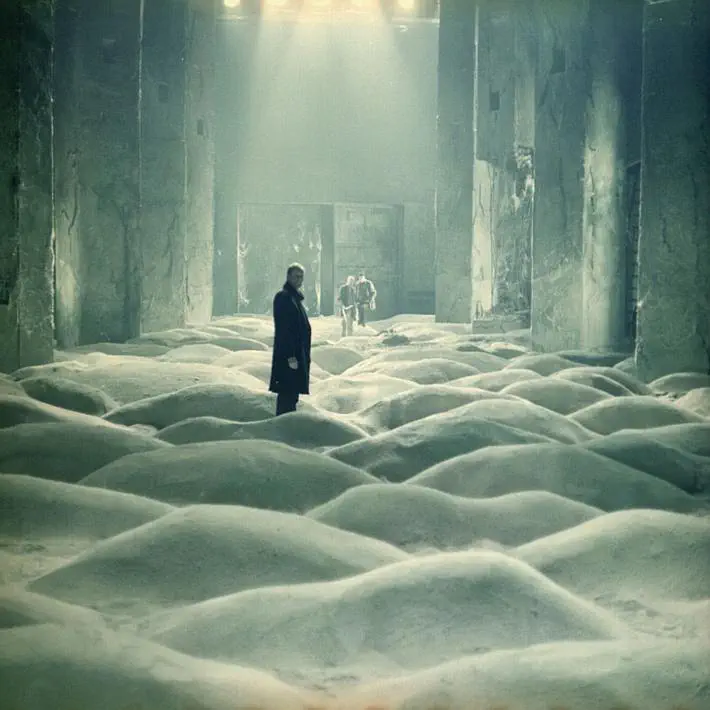
My first attempt to watch Stalker was during the eighties, on a VHS release. I went to a VHS rental shop and got this sturdy double tape box. It was highly recommended by a book on sci-fi history I was reading, but it ended being a big disappointment. I found it to be just an artsy fartsy low budget, with a Russian aura and all that. I was too young, too cynical, and, to be fair, the VHS on 14 inch screen must have made it a blur, a stain of brown-black and faded green—and this particular movie really demands its details and gorgeous cinematography (and sound) to shine.1At some IMDb board someone was saying he had watched it on a big screen—another guy just replied "lucky bastard!". Yet it's on the realm of ideas, metalanguage, ambiguity and spirituality that this one incandesces big.2I wrote this considerations around 2004 (at Projecting the dharma, a speech he gave at Yale). I didn't know Dzongsar Khyentse Rinpoche would say he finally understood the word "mahasiddha" through this movie. And that this is one of his favorite movies. I also had not read Geoff Dyer’s book "Zona" yet. The Zone is really a very complex eco(holo?)-system... You must abandon all hope, and never take the direct path to the room. Viewers that slow down their cinematic-event expectation rate will be highly rewarded—or not! Be warned of heavy spoilers from now on.
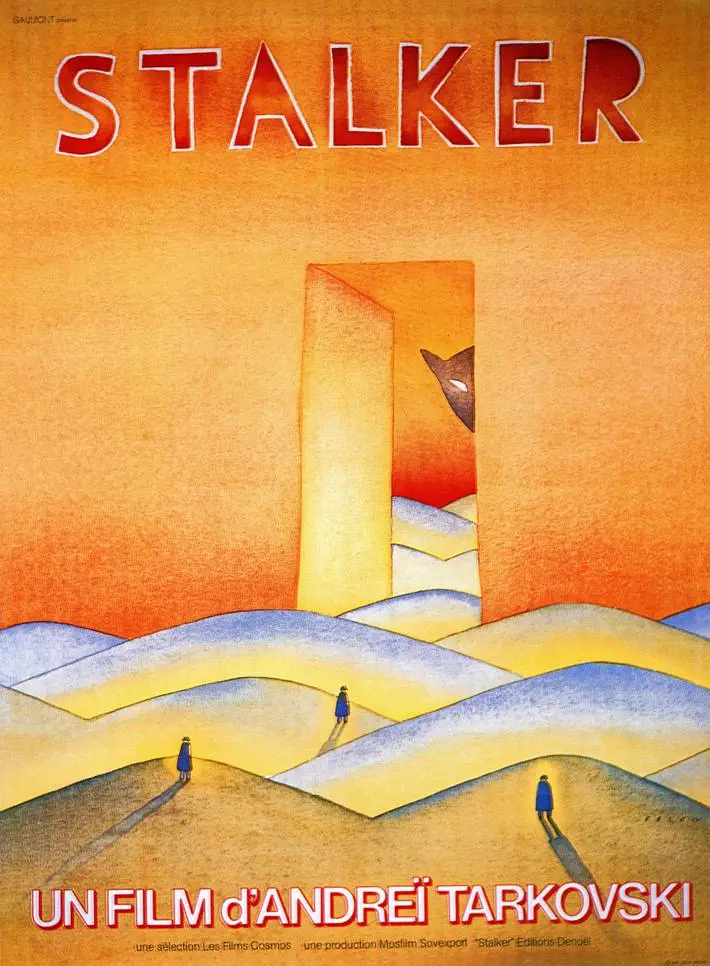
Nuclear Nostalgia
The original story3Which I amazingly happen to have in a European Portuguese translation—it has been left behind since I have sold almost all my books (specially science fiction) two years ago. The book has my exlibris from 1991. I have never read it. deals with non-ambiguous extraterrestrial caused Zones (plural, in the movie, singular), a "Roadside Picnic"4By Arkadi and Boris Strugatsky. (that's the title) with leftovers by aliens. Stalkers are those who illegally penetrate these Zones to steal fantastic stuff abandoned by aliens.
Tarkovsky took the raw stuff in an entirely new direction. We are never explicitly told what may have caused the Zone, we only know it is surrounded and protected by the government. In fact, we never know if there really is something special about it or if it is a myth perpetrated by the ignorant—but this is the great religious hook Tarkovsky makes use of, while at the same time giving an absurdly compelling criticism of the nuclear age, intellectualism and science.
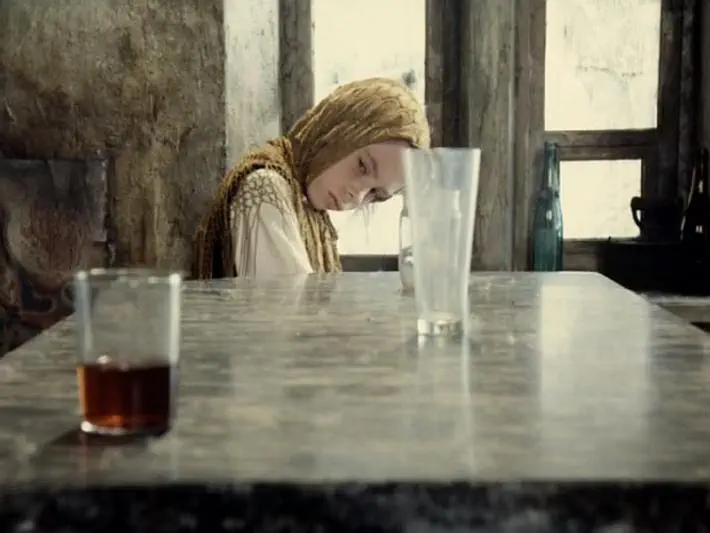
There were rumors in the USSR about a nuclear accident, and in fact only after the iron curtain fell out we were sure about it. Since no one said anything about it, what people would think a protected area would be? Could a myth be formed around it? Tarkovsky denies that the Zone is a nuclear area, but are we to trust him?
By the end of the movie, we see they have a nuclear power plant nearby. Some people even claim that the power plant showed in the movie is none other than Chernobyl5The nuclear accident was a little worse than the one in the 50's, and occurred 7 years after the release of the movie. 30 people died in the few days after the accident (200 in the accident in the 50's)—the firefighters even felt a "metallic taste" and "pins and needles in the face" while working to put out the fire, while people still weren't sure about leaking radiation. All the firefighters died within hours or days of exposure (radiation ionizes molecules, that's what they felt, ions)—but within the next few years it seems that less people than expected got sick (8 children died because of milk contaminated with an iodine isotope with a half-life of only eight days!). USSR also didn't tell anybody about this one, but the rise in radiation was felt in Sweden, where they found the source to be Chernobyl. (the movie wasn't filmed there, so we don't know for sure6He had made almost half of the movie when they found a problem while developing the film. Some people say he had used a bad Kodak experimental film—but in the USSR at that time, we never know. One wonders if it maybe was not only politics—at some places in that land even radiation itself would damage your film! It didn't happen this way, but it could have.).
The dream of easy energy and happiness for all, or the nightmare of sickness and deformity? The Zone is all hope and fear condensed.
The Writer and the Scientist
These two characters pay the Stalker for him to lead them through the Zone to a special room where "your innermost desire becomes true". Innermost, deepest, that's the important words. You don't really know yourself, what this desire might be. You will actually be confronted with your true being, your essence. That's your innermost desire.
Sometimes we have glimpses of the Stalker as someone who knows he is a fake, and is leading the men to a state of absolute lack of hope—does he know about the "radiation"? His daughter with no legs is a "punishment of the Zone"?...—where can they find what really matters? "Punishment" of its true vocation, as a leader of others through the wasteland of themselves?
The fact remains that they have no guts to enter the room—lost in arguments about it not being that special, one small step distant of it. The Stalker is the director, he puts us inside this room. He hopes we can see what he saw. Yet we have no guts to pursue the truth to the end... or will his crippled mutant daughter, the new generation, be able to lead us to it?
We are being led by Tarkoviskiy, but we can only watch exquisite faded frames of an old movie as himself and the actors are long dead, poisoned by the chemicals they were exposed to in those very locations. They realized great art, the Stalker has led them, yet this comes with a disturbing yet exhilarating conundrun: art only goes beyond deformity, sickness, death whilst in the very middle of it.
The Daughter and the Stalker
What is that telekinesis at the end? Are the glasses symbolical of the characters? Is Tarkovsky playing with the sound of the train? With our beliefs?
At the end, the Stalker loses faith in humanity, but at the beginning he saw the daughter moving the glass. What he believes, she shows.

The Wife and the Dog
Is the wife a junkie? What are all those syringes doing at the Zone? Society is doped, religion-doped, or really that's what some other loser got when in the Room. She tries to understand the Stalker's mission, but she's not ready to go with him. She is never ready. She doesn't understand or really accepts it, only that she sort of does. The Stalker's vocation is in tension with his marriage.
She tries to give away the dog, but the self-centered artist can't have six canines to take care off! Five is ok. Let the poor take care of the dog from the Zone.
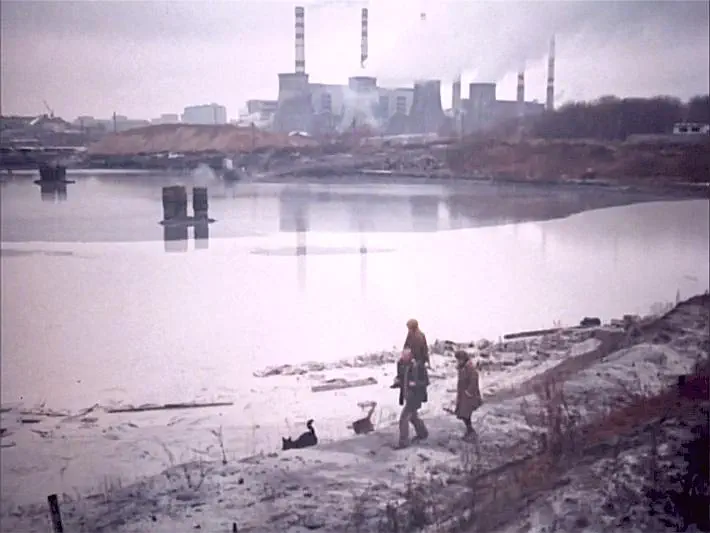
Pure Gimmick?
The unexpected bird disappearing? An impossible telephone call at the Zone. Tarkovsky sure plays with us, we can't conceptualize too much—in some very specific places it is his intention not to make sense, but he is direct about it, he is not one of those artists that fool us into big interpretations (like Lynch). The experience is eerie, almost too complicated, but simple; he reaches the core of pure faith.
1. ^ At some IMDb board someone was saying he had watched it on a big screen—another guy just replied "lucky bastard!".
2. ^ I wrote this considerations around 2004 (at Projecting the dharma, a speech he gave at Yale). I didn't know Dzongsar Khyentse Rinpoche would say he finally understood the word "mahasiddha" through this movie. And that this is one of his favorite movies. I also had not read Geoff Dyer’s book "Zona" yet.
3. ^ Which I amazingly happen to have in a European Portuguese translation—it has been left behind since I have sold almost all my books (specially science fiction) two years ago. The book has my exlibris from 1991. I have never read it.
4. ^ By Arkadi and Boris Strugatsky.
5. ^ The nuclear accident was a little worse than the one in the 50's, and occurred 7 years after the release of the movie. 30 people died in the few days after the accident (200 in the accident in the 50's)—the firefighters even felt a "metallic taste" and "pins and needles in the face" while working to put out the fire, while people still weren't sure about leaking radiation. All the firefighters died within hours or days of exposure (radiation ionizes molecules, that's what they felt, ions)—but within the next few years it seems that less people than expected got sick (8 children died because of milk contaminated with an iodine isotope with a half-life of only eight days!). USSR also didn't tell anybody about this one, but the rise in radiation was felt in Sweden, where they found the source to be Chernobyl.
6. ^ He had made almost half of the movie when they found a problem while developing the film. Some people say he had used a bad Kodak experimental film—but in the USSR at that time, we never know. One wonders if it maybe was not only politics—at some places in that land even radiation itself would damage your film! It didn't happen this way, but it could have.
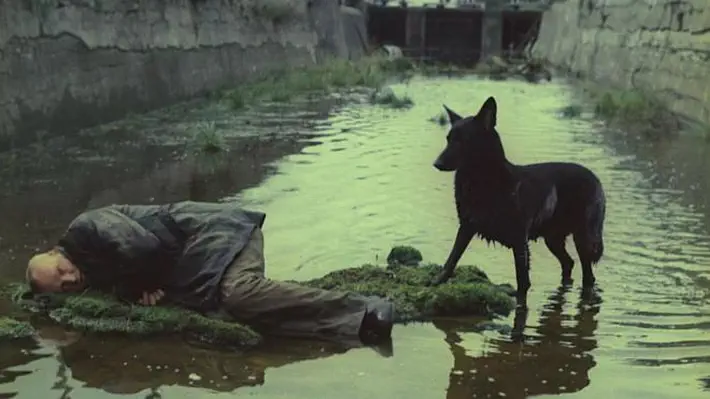 YouTube
YouTubeStalker trailer for the 2017 restoration
First time I watched Stalker was on VHS (a double tape feature) in a 14 tube TV. So I guess it was a bit blurry.
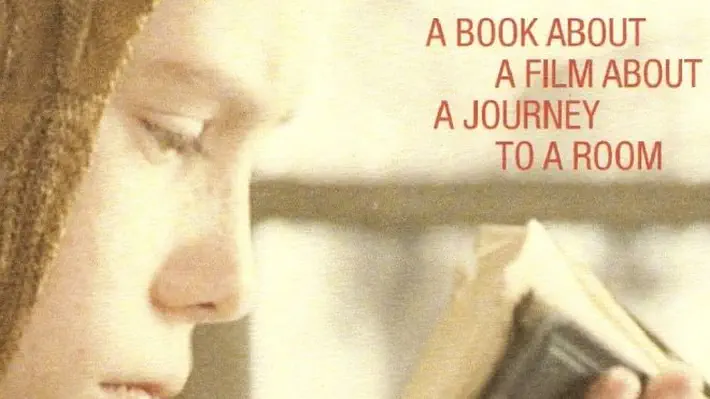 INDEPENDENT
INDEPENDENTZona by Geoff Dyer
Andrei Tarkovsky's film Stalker, released in the USSR in 1979, radiates an enduring sense of mystery and disquiet. I have seen it five times, though viewing can feel like a penance. // Tarkovsky erupted: it actually needed to be slower and duller at the start so that anyone who had walked into the wrong theatre would have time to leave before the action got under way.
 tzal.org
tzal.orgStalker's Wife
Stalker’s wife walks towards the wall and then sits down, turns to the camera and takes a cigarette from her packet. A dreadful moment, this, for me. By lighting and smoking a cigarette she turns herself, instantly, into something hideous. That sheepskin coat, we realize now, must stink of cigarettes— and her hair. And it’s not just that: I hate all gestures associated with finding, lighting and smoking a cigarette. Geoff Dyer, Zona
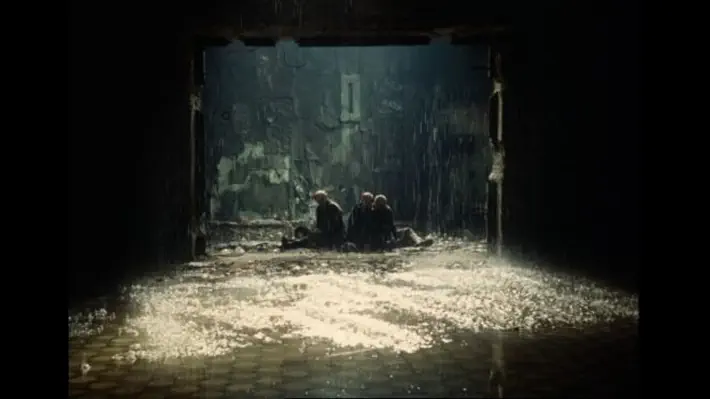 tzal.org
tzal.orgThe Room Reveals All
What you get is not what you think you wish for but what you most deeply wish for. In which case my fear is that my deepest wish might not be to have had Jane sitting on my face and Cindy on my dick but something really embarrassing, something that I would not want to be made public. Like what? That instead of basking in the fact that I’d managed to get a squalid, rent-controlled flat in Brixton I’d somehow cobbled together money for the deposit to buy a flat in the area when prices, as a result of the riots—or ‘uprisings’ as we insisted on calling them—were at an alltime low, ideally a council flat during the big Thatcherite sell-off to which we were all bitterly opposed. I bet that’s the universal wish of most people in the Western world: that they’d got on the property ladder earlier.





